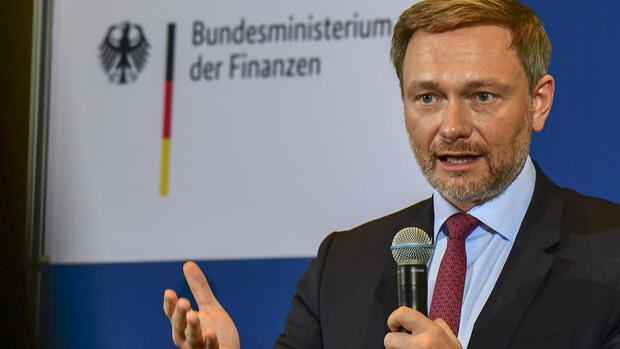With a supplementary budget, the new finance minister wants to ensure that the traffic light coalition has an additional 60 billion euros at its disposal.
(Photo: dpa)
Berlin Under Christian Lindner (FDP), the Federal Ministry of Finance is to become an “enabling ministry”, as he said when he took office. The new finance minister wants to ensure that enough money is available for all the projects of the traffic light coalition.
As one of his first official acts, Lindner is now launching a supplementary budget with which he intends to set aside 60 billion euros for the coming years. This was confirmed to the Handelsblatt in government circles. The 2021 supplementary budget is due to be approved by the cabinet on Monday.
Lindner’s predecessor, the new Chancellor Olaf Scholz (SPD), has budgeted a record debt of 240 billion euros for this year due to the pandemic. This high deficit is possible because the then grand coalition suspended the debt brake with the emergency clause due to the corona crisis. But it is now clear that only around 180 billion will be needed. The economy has developed better than feared.
Nevertheless, Lindner does not want to incur any less debt. The 240 billion euros are to be used in full. The approximately 60 billion euros that are not needed this year should flow into the Energy and Climate Fund (EKF). They are then available there as a reserve for the coming years.
Top jobs of the day
Find the best jobs now and
be notified by email.
With this, Lindner implements an agreement from the coalition agreement between the SPD, Greens and FDP. “We will develop the Energy and Climate Fund (EKF) into a climate and transformation fund,” it says there. “In the 2021 budget, we will provide funds from already budgeted and unused credit authorizations through a supplementary budget to the Climate and Transformation Fund (KTF), earmarked for additional climate protection measures and measures to transform the German economy.”
The Federal Audit Office is critical
Behind this budget trick is the following consideration: The traffic light coalition has decided to comply with the debt brake again from 2023. Then she will foreseeably have too little money available for all her projects. That is why it is now building large reserves in the exceptional Corona year in which the debt brake is suspended. Scholz has also already used this trick. Last year, when the debt brake was also suspended, he parked 26 billion euros in the EKF.
However, there is criticism of this approach. The President of the Federal Audit Office, Kay Scheller, has already warned Lindner and the traffic light coalition to proceed in this way. “This is constitutionally problematic,” said Scheller in an interview with Handelsblatt. “The funds were earmarked for combating the pandemic, now they are to be used for climate investments in the coming years,” said Scheller. “There is then no reference to the emergency with which the suspension of the debt brake was justified.”
Lawyers have also criticized the plan. In the Federal Ministry of Finance, on the other hand, the procedure is considered harmless, and it has been legally checked internally.
Politically, the supplementary budget is likely to be a controversial issue. The Union is already criticizing. “In the traffic light coalition there is a real competition to invent circumventing facts for the debt brake,” said the Bavarian Finance Minister Albert Füracker (CSU). “The coalition agreement is a collection of ideas on how the debt rule can be overturned.”
In the traffic light groups, one considers the criticism to be exaggerated. It is pointed out that Scholz and the grand coalition themselves used the trick in 2020 and parked money in the EKF. At that time, the Union supported that.
More: Climate protection, citizens’ money, digitization: what exactly the traffic light has agreed on – and how it wants to finance it.
